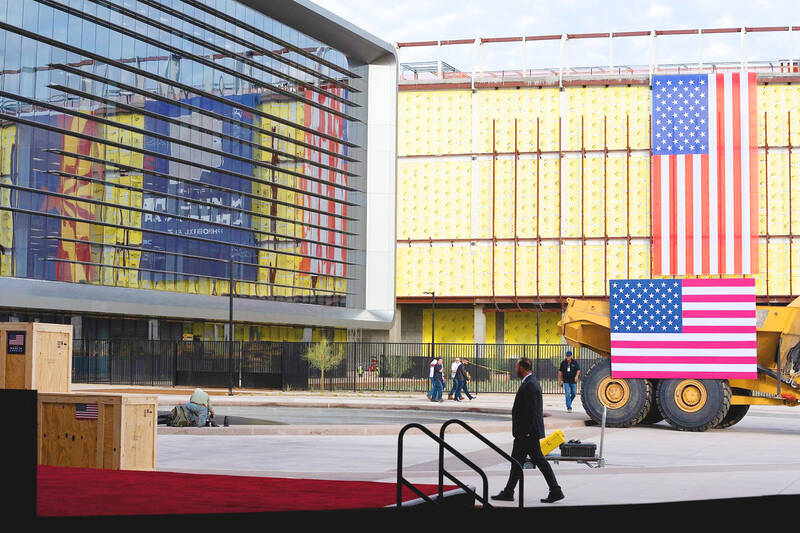The administration of US President Joe Biden finalized its CHIPS Act incentive awards for Taiwan Semiconductor Manufacturing Co (TSMC, 台積電), marking a major milestone for a program meant to bring semiconductor production back to US soil.
TSMC would get US$6.6 billion in grants as part of the contract, the US Department of Commerce said in a statement yesterday. Though the amount was disclosed earlier this year as part of a preliminary agreement, the deal is now legally binding — making it the first major CHIPS Act award to reach this stage.
The chipmaker, which is also taking up to US$5 billion in loans, would get at least US$1 billion of the total this year, because it has already achieved some of the benchmarks required, officials said.

Photo: Caitlin O’Haram, Bloomberg
Finalizing the agreement with TSMC guarantees that cutting-edge semiconductor manufacturing would return to the US, bringing essential capabilities onshore, US Secretary of Commerce Gina Raimondo said in a briefing.
“This is some of the most sought-after technology on the planet,” she said. “It’s impossible to overestimate how significant this is for America’s national and economic security.”
More deals would be completed in the coming weeks, solidifying one of the country’s biggest pieces of industrial policy in decades and a signature piece of legislation for the outgoing Biden administration.
The CHIPS and Science Act set aside US$39 billion in grants, US$75 billion in loans and loan guarantees, and 25 percent tax credits — all to lure semiconductor manufacturing to the US after decades of production shifting to Asia. The vast majority of the funds have been allocated, but only a portion of those awards are set in stone, including one small grant announced in September.
In TSMC’s case, the money would help underwrite more than US$65 billion of spending to build a three-factory complex north of Phoenix, Arizona. More funds would be released when the company hits additional targets. The project is the largest-ever foreign direct investment by a company in a new site, the Commerce Department said.
Officials are under increasing pressure to wrap up talks and get money out the door. Business groups in four states with projects in line for CHIPS Act funding — Ohio, New Mexico, Oregon and New York — pushed for the immediate release of that money in a recent letter to Biden, the Columbus Dispatch reported.
Three of those states have projects by Intel Corp, and that company’s chief executive officer has expressed his frustration with the process. Intel is facing serious business challenges that have complicated its CHIPS Act negotiations. The chipmaker is still working through substantive terms of its contract, including what happens if the company spins off its manufacturing business or is acquired in part or in whole.
US president-elect Donald Trump’s return to the White House in January has added urgency to the effort.
There is little fear among companies that the CHIPS Act would go away, but firms like Intel, Samsung Electronics Co and Micron Technology Inc are eager to avoid the possibility of having to renegotiate terms with a new administration.

TAKING STOCK: A Taiwanese cookware firm in Vietnam urged customers to assess inventory or place orders early so shipments can reach the US while tariffs are paused Taiwanese businesses in Vietnam are exploring alternatives after the White House imposed a 46 percent import duty on Vietnamese goods, following US President Donald Trump’s announcement of “reciprocal” tariffs on the US’ trading partners. Lo Shih-liang (羅世良), chairman of Brico Industry Co (裕茂工業), a Taiwanese company that manufactures cast iron cookware and stove components in Vietnam, said that more than 40 percent of his business was tied to the US market, describing the constant US policy shifts as an emotional roller coaster. “I work during the day and stay up all night watching the news. I’ve been following US news until 3am

Six years ago, LVMH’s billionaire CEO Bernard Arnault and US President Donald Trump cut the blue ribbon on a factory in rural Texas that would make designer handbags for Louis Vuitton, one of the world’s best-known luxury brands. However, since the high-profile opening, the factory has faced a host of problems limiting production, 11 former Louis Vuitton employees said. The site has consistently ranked among the worst-performing for Louis Vuitton globally, “significantly” underperforming other facilities, said three former Louis Vuitton workers and a senior industry source, who cited internal rankings shared with staff. The plant’s problems — which have not

UNCERTAINTY: Innolux activated a stringent supply chain management mechanism, as it did during the COVID-19 pandemic, to ensure optimal inventory levels for customers Flat-panel display makers AUO Corp (友達) and Innolux Corp (群創) yesterday said that about 12 to 20 percent of their display business is at risk of potential US tariffs and that they would relocate production or shipment destinations to mitigate the levies’ effects. US tariffs would have a direct impact of US$200 million on AUO’s revenue, company chairman Paul Peng (彭雙浪) told reporters on the sidelines of the Touch Taiwan trade show in Taipei yesterday. That would make up about 12 percent of the company’s overall revenue. To cope with the tariff uncertainty, AUO plans to allocate its production to manufacturing facilities in

TARIFF CONCERNS: The chipmaker cited global uncertainty from US tariffs and a weakening economic outlook, but said its Singapore expansion remains on track Vanguard International Semiconductor Corp (世界先進), a foundry service provider specializing in producing power management and display driver chips, yesterday withdrew its full-year revenue projection of moderate growth for this year, as escalating US tariff tensions raised uncertainty and concern about a potential economic recession. The Hsinchu-based chipmaker in February said revenues this year would grow mildly from last year based on improving supply chain inventory levels and market demand. At the time, it also anticipated gradual quarter revenue growth. However, the US’ sweeping tariff policy has upended the industry’s supply chains and weakened economic prospects for the world economy, it said. “Now